Australian Open 2023: Novak Djokovic deportation, visa cancellation scandal still burns
After being attacked by ‘the whole world’, Novak Djokovic explains the three things he learned from last year’s ugly deportation scandal. 12 months on, we revisit the incredible saga.
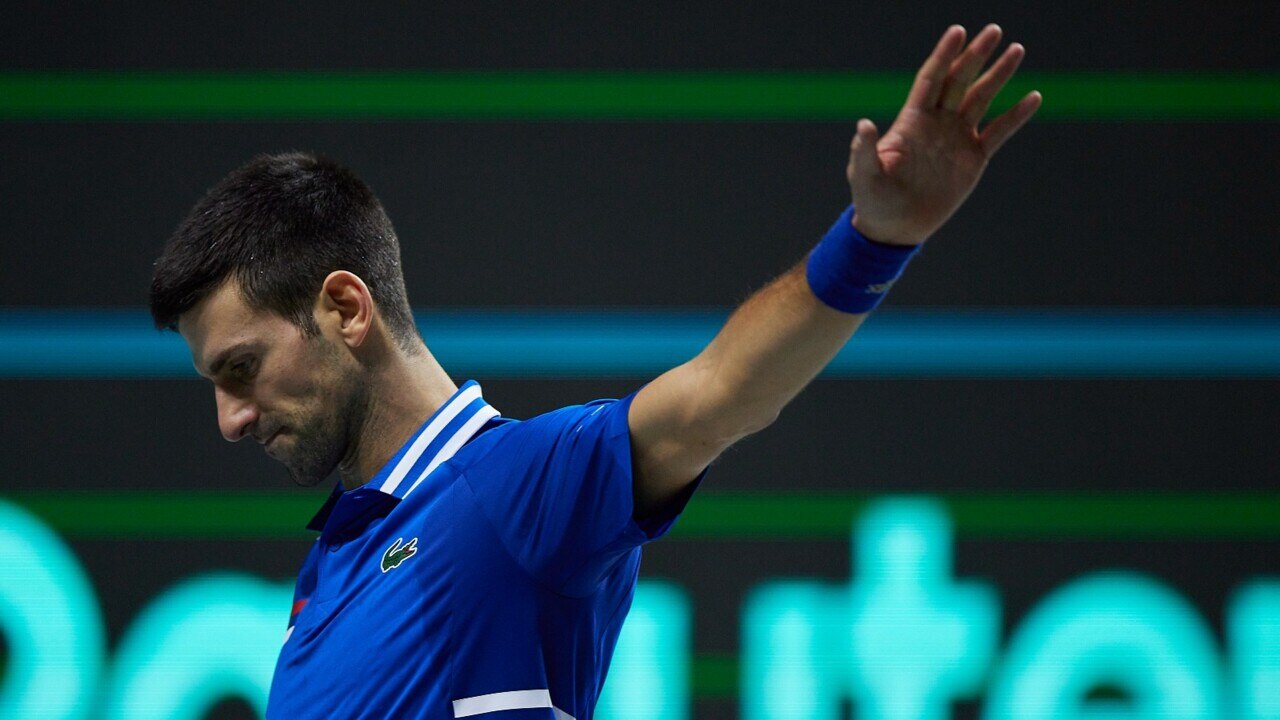
It was just before 6pm on the balmy Melbourne Friday night that the muscle was flexed.
Not the frightening bicep of a Novak Djokovic forehand down the line, but a press release from the federal immigration Minister delivering the political equivalent of a blistering smash.
It was January 14 – just two and a half days out from the tournament’s official start.
It had been a battle that raged for almost two weeks – Djokovic questioned on entry to Australia amid a vaccination stoush that saw him allowed to enter, then be detained, allowed to train at Rod Laver Arena, detained again and eventually deported, all amid countless court hearings and all-nighters by a top legal team tasked with his case that earned global attention.
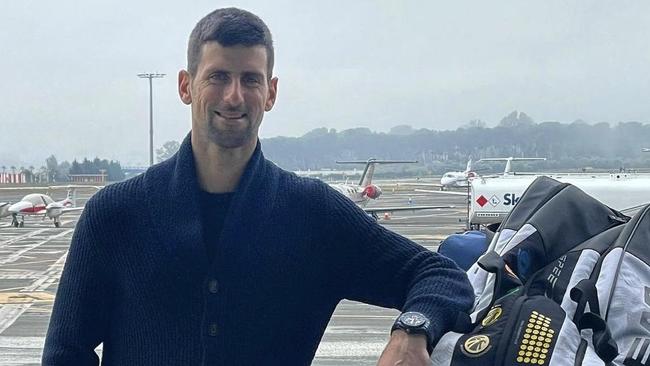
Late night press conferences by family members, hundreds of protesters storming the streets and jumping aboard cars, weekend Federal court hearings streamed online and messages from Serbia to “hold on, son” – all as the world’s top tennis players counted down the hours to the year’s first grand slam.
Even the top streaming service’s script writers couldn’t have come up with this one.
How Australia emerged on the world stage remains a point of discussion. Many questions remain unanswered.
“The main takeaways from everything that happened are patience, belief in yourself and adhering to principles you care about,” the now 21-time slam winner said in an interview with Tennis Majors this week.
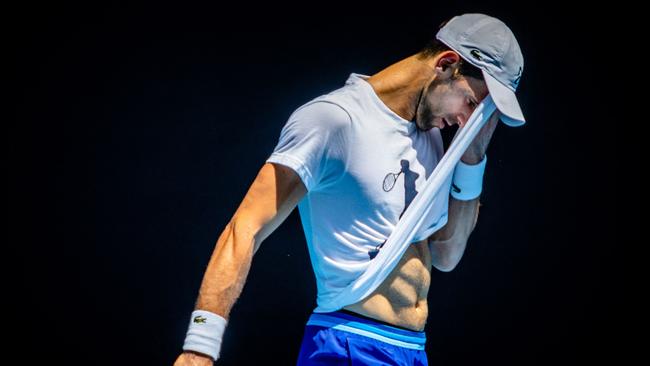
“I have experienced difficult moments in Australia and the aftermath: being attacked from all angles, basically from the whole world, but I expected something like that, considering how the society works these days – there always has to be one individual who is guilty of something. That is how the games are played and things are hidden.”
“It was really tough for me to handle,” he said.
“Patience and the feeling of togetherness with my family and close ones have helped me overcome all the obstacles to be where I am today. I strive to be better, I am open to everything life can teach and test me in, that is my motto, generally speaking.”
On January 4, 2022, Djokovic declared he was on his way to Australia. On January 5, he arrived at Tullamarine. Detained into the early hours of January 6, he was denied entry to Australia and his visa cancelled.
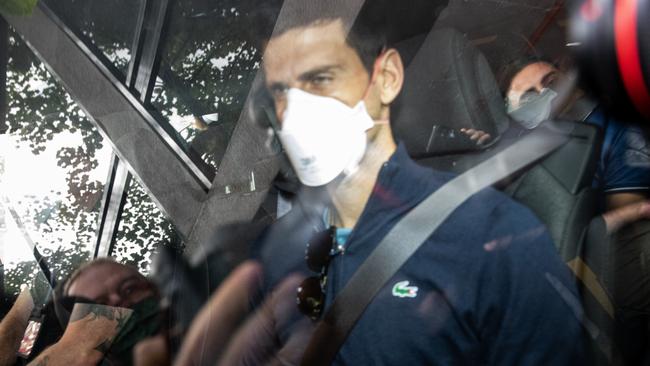
On January 10, court hearings for his appeal saw Djokovic admit officially he was not vaccinated against Covid-19, citing a recent infection as part of an exemption. Outrage was sparked when documents and social media posts proved he had attended a children’s sports awards event in Serbia while awaiting his test results. As it raged, his visa was reinstated by the Federal Court and released from immigration detention and practised at Melbourne Park within hours.
On January 13, he was included in the tournament’s main draw as the No.1 seed.
By just after 5.50pm on January 14, his visa was cancelled. Again.
In the hours that followed Hawke’s decision on this day last year, Djokovic remained at a residential address in Melbourne before being transported back to an infamous immigration facility in Carlton that had housed refugees amid the city streets – some of whom had been housed there for years.
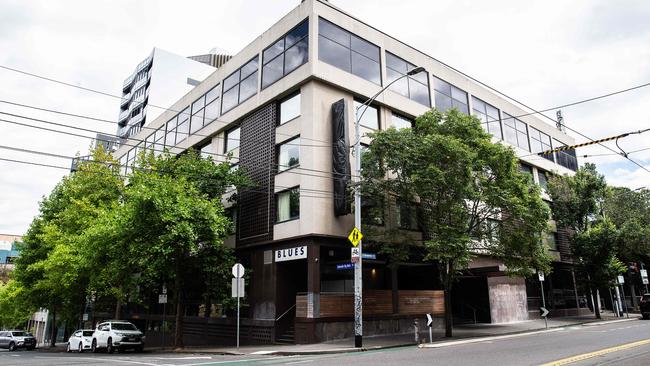
It was a facility where asylum seekers had previously shared images of food they had been dished up allegedly filled with maggots and mould.
Czech player Renata Voracova was also housed there, with her visa also revoked over her vaccination status.
The facility has since been shut down and sits empty but for a bunch of mail under the door when News Corp visited this week.
On January 16, when Djokovic should have been playing his opening round match against fellow Serbian Miomir Kecmanovic, the wheels were lifted of his plane at Tullamarine and he left Australian soil.
“It was probably the worst thing tennis could have done to him,” Australian star Nick Kyrgios said on The JBK Show podcast this week.
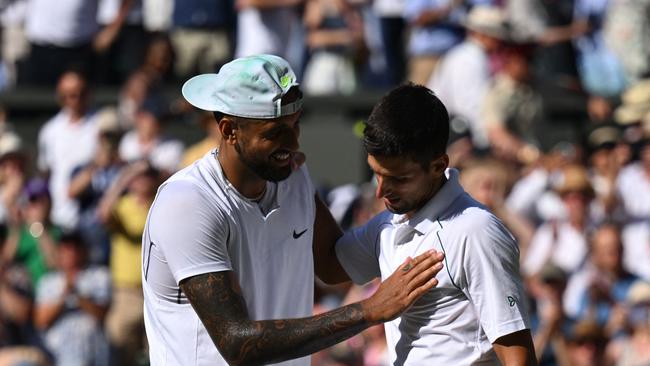
“Because now he’s just hungry. Every event he’s playing, he knows he might not be able to play the next week, so he’s going to do everything he can to win that tournament He’s almost harder to beat now.”
Kyrgios had supported what he described at the time as an “alienated” Djokovic, criticising a lack of backing from other players and slamming his treatment.
He revealed this week that the pair will play doubles together at the upcoming Indian Wells event.
“We chat a lot now,” Kyrgios said.
“No one else did (stand up for him), but me. No one deserves to be treated like that, whether you’re a tennis player or not.”
Andy Murray was in Melbourne at the time the drama was unfolding.
He’s known Djokovic since the pair were 11 years old – now with six children, 24 grand slams and a knighthood between them after first crossing paths as then-juniors, full of promise.
“It just felt like the situation could have been avoided,” he said this week.
“Novak is someone that I’ve known since we were 11 years old, so seeing him in that situation was, for me, not nice.
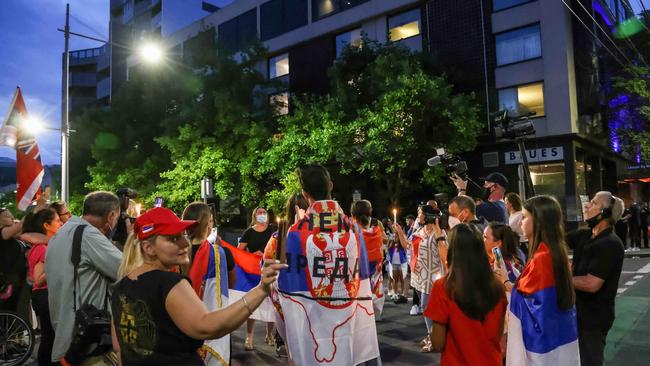
“I didn’t enjoy seeing that. But I also think the situation could have been avoided. It didn’t need to get to that.”
Fellow Australian Open champion Stan Wawrinka told News Corp that he had “never saw something like” the saga that ensued on the eve of last year’s tournament.
“But then, nobody saw Covid (coming), and Covid completely changed the world,” Wawrinka said.
“It changed the way people live, changed the way people think and changed everything in this world since 2020. Things are different.
“I think about Novak and Australia and Melbourne and I think … people love the sport so much that they will cheer for him. He is an amazing champion. He’s won here so many times. People love him because he’s playing so well. He is a great champion and everyone will be happy to see him, and when you play a grand slam, as a fan or as a tennis player, you want all the players to be able to play if that’s possible. This year it’s possible, so everybody will be happy to see all those matches.”
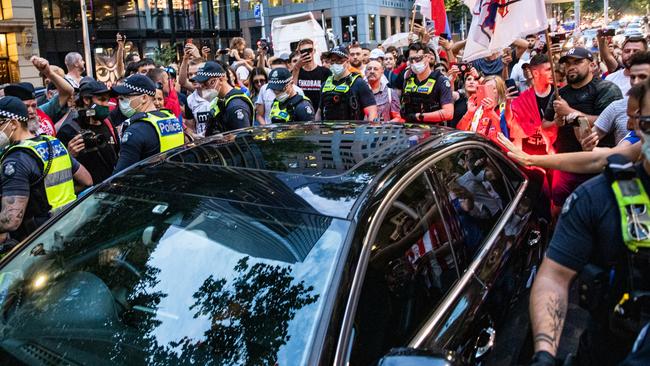
Top media lawyer Justin Quill said he considered Australia to have come out of the saga “really badly”.
“Interestingly, travelling at the moment, I can tell that,” he said.
“I’m overseas at the moment and one thing I’m hearing constantly is the perception of people of the way we handled lockdown and ‘Novax’ – the treatment of Novak Djokovic – was no doubt part of that perception that we were very, very heavy-handed.”
He said the drama that engulfed the world’s media and tennis fans amid court hearings and appeals had only fuelled further confusion.
“We invited him here, he then turned up, we locked him up, we let him out to practice, then we locked him up and we sent him home,” Quill recalled.
“It was back and forth – he won the legal case, the Minister stepped in again. It seemed like that between Tennis Australia, the Victorian government, the federal government and border force … they seemed like Keystone cops in the way it got handballed around and chopped and changed.
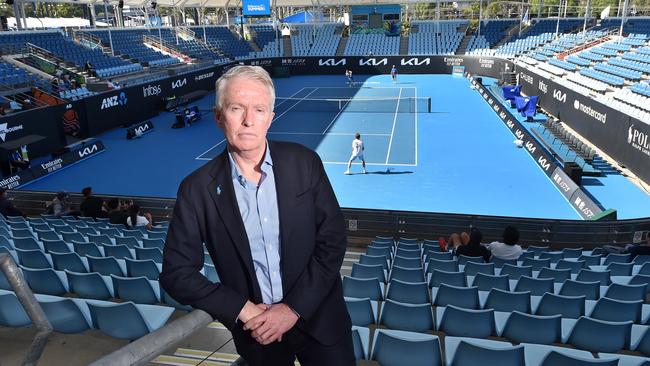
“I think we came out of it incredibly poorly.
“The fact that he’s here now still not vaccinated, back playing, it demonstrates how silly it was last year.”
And politics, he said, had reigned supreme.
“I wonder if the Liberals had got back into power, or if there hadn’t been an election and they were still in power, if he would have gotten back? I doubt he would,” Quill said.
Tennis Australia boss Craig Tiley has issued a warning to fans who jeer Djokovic that yet could face ejection from the grand slam in a move Quill said was simply another indicator of Australia’s “nanny state” mentality.
“It’s more of the same – more regulations and rules, of ‘we will tell you how to do things’,” he said.
Serbian fans turned out as Djokovic played a practice match on Wednesday, some bringing signs declaring “Volimo Te Nole” – “We Love You, Novak”.
It’s a far cry from their support in song, shouting and swarming cars outside Djokovic’s legal team offices in Flinders Lane this week last year.
In a quirky turn of events, Quill found himself firmly at the centre of a tsunami of Serbian fans when his Melbourne office turned out to be in the same building as where Djokovic was holed up with his legal team on this weekend 12 months ago.
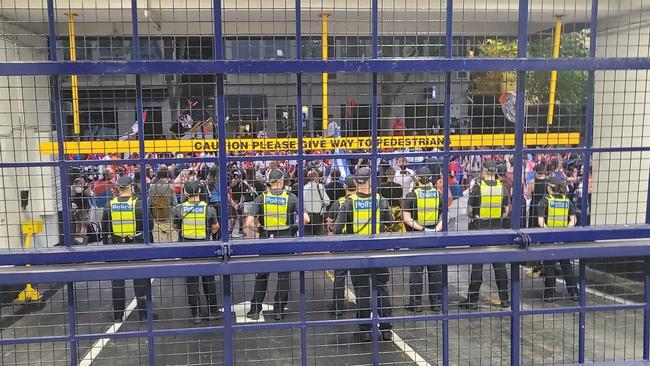
Emerging at 7pm to go to his car, Quill was met with around 20 police officers he likened to “the riot squad”, a locked carpark gate and up to 400 Djokovic supporters clad in Serbian flags and leading chanting in the street.
“I walked over to one of the police and said ‘am I going to be able to get my car out?’. He looked towards the 400 Serbians and just said ‘no mate … call an Uber’,” he said.
“I had to go out another exit, get home, and then get another Uber back there at 6am the next morning.”
Out of pocket but with a dinner party story that will endure far beyond the grand slam champion’s career, Quill joked that Djokovic could repay his ride-share bill in familiar territory.
“I’m a mad tennis fan, so I’d take a hit of tennis with him to pay that off,” he laughed.






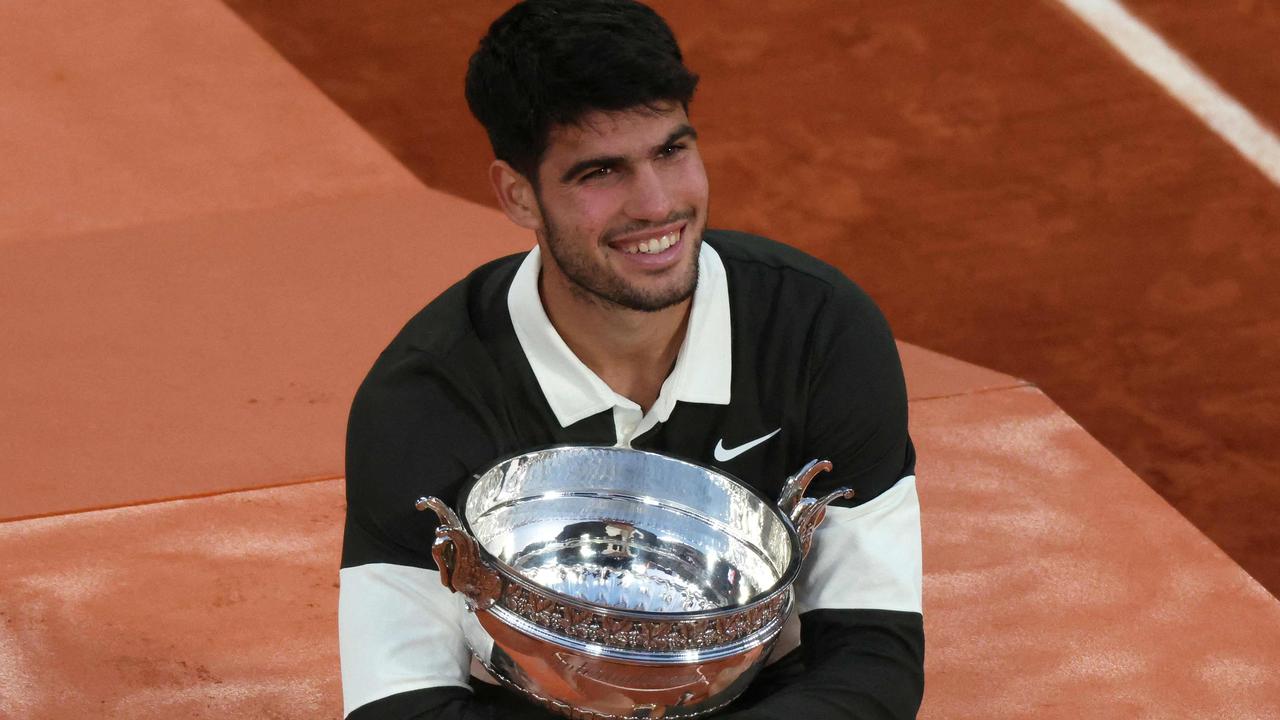
To join the conversation, please log in. Don't have an account? Register
Join the conversation, you are commenting as Logout